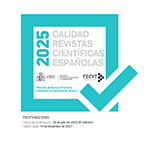Spanish public television under review: political interference on TVE through parliamentary control (1982-1986)
Abstract
The study of literary critique texts published in the press is a relevant part of critical social research. It is a type of foundational text in the press media system, which moves between literature and incipient journalism in such a rich and complex way that makes it a particularly interesting document to know the way in which the press shaped the mediatized public sphere. We show the role played by the literary critique of Hernán Díaz Arrieta (Alone) during the Unidad Popular period (1970-1973). To do so, we applied the critical analysis of the discourse metodology to a corpus of his literary critiques, published mainly in the newspaper El Mercurio at that time. The research shows, generally, how literary critique is a text that contributes to the political discussion of an era and, specifically, how Alone's critiques were part of the rhetoric that promoted the end of the Unidad Popular government and the installment of the military dictatorship in Chile.
Downloads
Article download
License
In order to support the global exchange of knowledge, the journal Estudios sobre el Mensaje Periodístico is allowing unrestricted access to its content as from its publication in this electronic edition, and as such it is an open-access journal. The originals published in this journal are the property of the Complutense University of Madrid and any reproduction thereof in full or in part must cite the source. All content is distributed under a Creative Commons Attribution 4.0 use and distribution licence (CC BY 4.0). This circumstance must be expressly stated in these terms where necessary. You can view the summary and the complete legal text of the licence.










